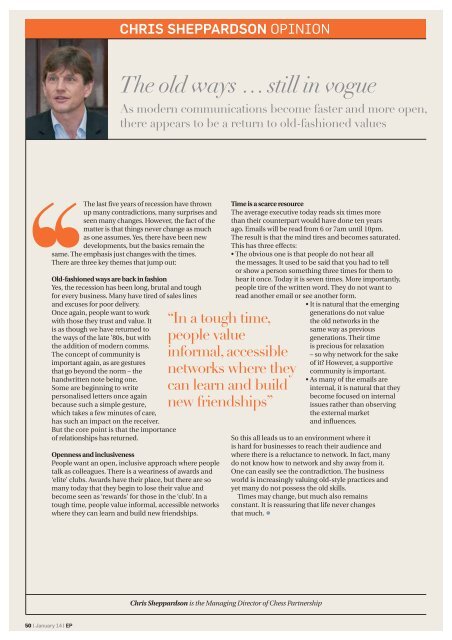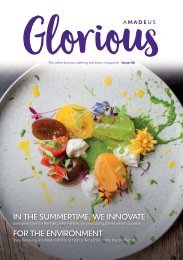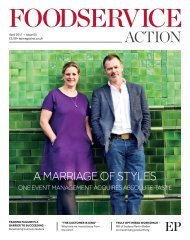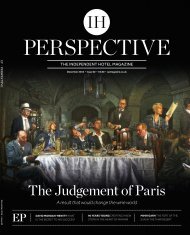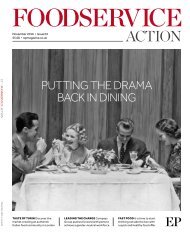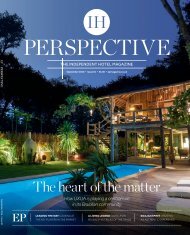EP Business in Hospitality Issue 48 - January 2014
EP magazine provides a reference point for executives on topical issues which may impact business growth, industry structure, professional and skill development, and broader economic and political changes. The magazine reports on all sectors of the industry, including hotels, restaurants, events and foodservice (contract catering).
EP magazine provides a reference point for executives on topical issues which may impact business growth, industry structure, professional and skill development, and broader economic and political changes. The magazine reports on all sectors of the industry, including hotels, restaurants, events and foodservice (contract catering).
Create successful ePaper yourself
Turn your PDF publications into a flip-book with our unique Google optimized e-Paper software.
CHRIS SH<strong>EP</strong>PARDSON OPINION<br />
The old ways … still <strong>in</strong> vogue<br />
As modern communications become faster and more open,<br />
there appears to be a return to old-fashioned values<br />
The last five years of recession have thrown<br />
up many contradictions, many surprises and<br />
seen many changes. However, the fact of the<br />
matter is that th<strong>in</strong>gs never change as much<br />
as one assumes. Yes, there have been new<br />
developments, but the basics rema<strong>in</strong> the<br />
same. The emphasis just changes with the times.<br />
There are three key themes that jump out:<br />
Old-fashioned ways are back <strong>in</strong> fashion<br />
Yes, the recession has been long, brutal and tough<br />
for every bus<strong>in</strong>ess. Many have tired of sales l<strong>in</strong>es<br />
and excuses for poor delivery.<br />
Once aga<strong>in</strong>, people want to work<br />
with those they trust and value. It<br />
is as though we have returned to<br />
the ways of the late ’80s, but with<br />
the addition of modern comms.<br />
The concept of community is<br />
important aga<strong>in</strong>, as are gestures<br />
that go beyond the norm – the<br />
handwritten note be<strong>in</strong>g one.<br />
Some are beg<strong>in</strong>n<strong>in</strong>g to write<br />
personalised letters once aga<strong>in</strong><br />
because such a simple gesture,<br />
which takes a few m<strong>in</strong>utes of care,<br />
has such an impact on the receiver.<br />
But the core po<strong>in</strong>t is that the importance<br />
of relationships has returned.<br />
Openness and <strong>in</strong>clusiveness<br />
People want an open, <strong>in</strong>clusive approach where people<br />
talk as colleagues. There is a wear<strong>in</strong>ess of awards and<br />
‘elite’ clubs. Awards have their place, but there are so<br />
many today that they beg<strong>in</strong> to lose their value and<br />
become seen as ‘rewards’ for those <strong>in</strong> the ‘club’. In a<br />
tough time, people value <strong>in</strong>formal, accessible networks<br />
where they can learn and build new friendships.<br />
Time is a scarce resource<br />
The average executive today reads six times more<br />
than their counterpart would have done ten years<br />
ago. Emails will be read from 6 or 7am until 10pm.<br />
The result is that the m<strong>in</strong>d tires and becomes saturated.<br />
This has three effects:<br />
• The obvious one is that people do not hear all<br />
the messages. It used to be said that you had to tell<br />
or show a person someth<strong>in</strong>g three times for them to<br />
hear it once. Today it is seven times. More importantly,<br />
people tire of the written word. They do not want to<br />
read another email or see another form.<br />
• It is natural that the emerg<strong>in</strong>g<br />
generations do not value<br />
“In a tough time,<br />
people value<br />
<strong>in</strong>formal, accessible<br />
networks where they<br />
can learn and build<br />
new friendships”<br />
the old networks <strong>in</strong> the<br />
same way as previous<br />
generations. Their time<br />
is precious for relaxation<br />
– so why network for the sake<br />
of it? However, a supportive<br />
community is important.<br />
• As many of the emails are<br />
<strong>in</strong>ternal, it is natural that they<br />
become focused on <strong>in</strong>ternal<br />
issues rather than observ<strong>in</strong>g<br />
the external market<br />
and <strong>in</strong>fluences.<br />
So this all leads us to an environment where it<br />
is hard for bus<strong>in</strong>esses to reach their audience and<br />
where there is a reluctance to network. In fact, many<br />
do not know how to network and shy away from it.<br />
One can easily see the contradiction. The bus<strong>in</strong>ess<br />
world is <strong>in</strong>creas<strong>in</strong>gly valu<strong>in</strong>g old-style practices and<br />
yet many do not possess the old skills.<br />
Times may change, but much also rema<strong>in</strong>s<br />
constant. It is reassur<strong>in</strong>g that life never changes<br />
that much. •<br />
Chris Sheppardson is the Manag<strong>in</strong>g Director of Chess Partnership<br />
50 | <strong>January</strong> 14 | <strong>EP</strong>


